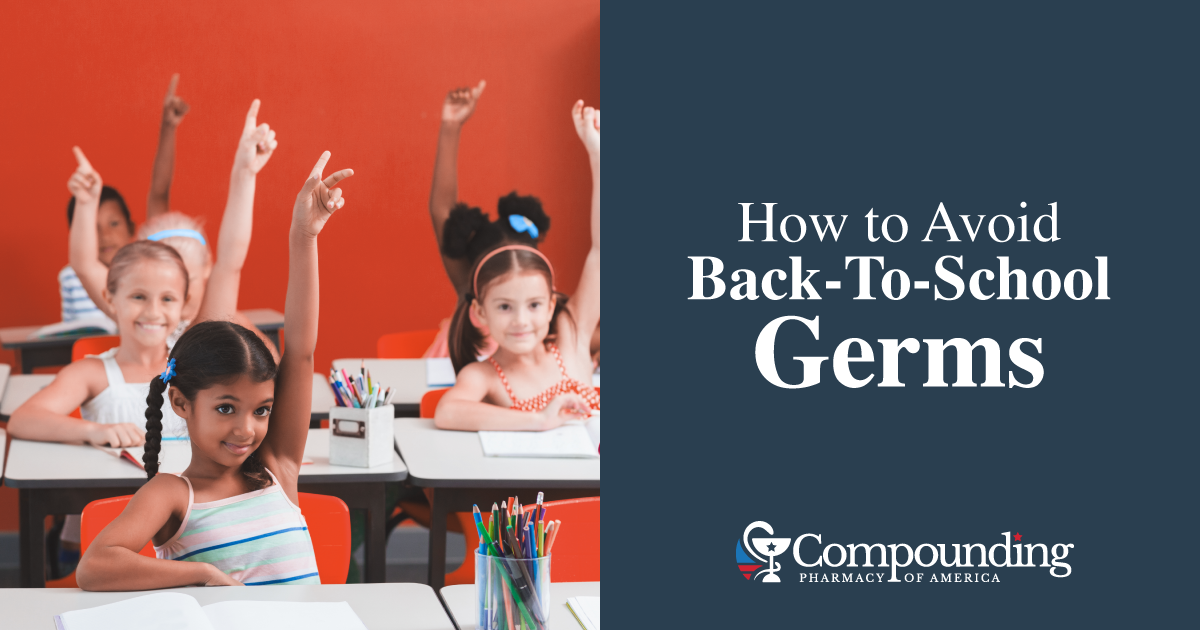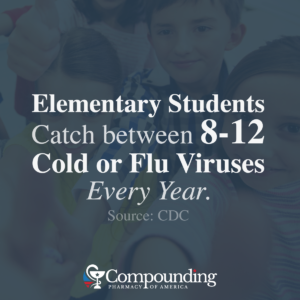 Prevent Back-to-School Illness in 2017
Prevent Back-to-School Illness in 2017
When school starts in the fall, it’s an exciting time of year. The joy parents feel at seeing their kids so happy is tempered by the fear of illnesses that come along with school.
At the Compounding Pharmacy of America, our goal is to keep your family well – especially during the back-to-school season. Follow these tips to keep your little ones from getting sick this school year.
Recognize Danger Zones: Where School Germs Live
 Schools are full of germs because they’re full of kids – kids who don’t always remember to wash their hands or cover their noses when they sneeze. Most kids don’t give basic hygienic practices a second thought.
Schools are full of germs because they’re full of kids – kids who don’t always remember to wash their hands or cover their noses when they sneeze. Most kids don’t give basic hygienic practices a second thought.
Though children might be small, the spray from their coughs and sneezes is mighty, exposing their classmates to whatever made them sneeze in the first place.
The CDC says elementary students each catch between eight and 12 cold or flu viruses every year. The younger they are, the more susceptible they are to infection.
Children are also more unaware of how often they touch their face and transfer germs to other people. Some areas of school have a higher concentration of germs than others.
Teach your children to be especially careful around these areas:
The Water Fountain
Students touch the button or knob with germy hands, then put their mouth by the faucet to drink. Send children to school with water bottles instead of having them rely on fountains.
If they forget to take water, teach them to run a little water from the fountain before they drink and wash their hands immediately after.
Lunch Trays
Kids go through the lunch line in a group, spreading germs on everything within reach. Teach children to carry their tray to the table, then use hand sanitizer before they start to eat.
Bathroom Doors
Even when children remember to wash up after a trip to the bathroom, their best efforts sometimes leave a lot to be desired. Emphasize the importance of washing, then show them how to use a paper towel to open the door.
Student Work Stations
Group seating encourages teamwork, collaboration…and the spread of germs. Send your child with a pack of antibacterial wipes and encourage them to regularly disinfect their area.
How to Fight Common Illnesses
It’s possible to keep kids healthy at school, but prevention takes work. Here are some of the most common infections and how to avoid them.
Pink Eye
Also known as conjunctivitis, pink eye causes itching and redness. It’s spread when an infected child touches their eyes and spreads discharge to surfaces. Teach kids to avoid touching their face and encourage frequent hand-washing.
Hand, Foot and Mouth Disease
The coxsackievirus, the scientific name for hand, foot and mouth disease, lives in saliva and spreads when kids put things in their mouths then touch surfaces other children will also touch. Symptoms include a painful rash in the mouth, on palms and on feet.
Stress the importance of not sharing food or putting things in their mouth that don’t belong there.
Head Lice
Any time there’s head-to-head contact, lice can spread. Lice can live on rugs, in backpacks and on coats, but they spread most often by head-to-head contact – like when kids share an iPad or video screen.
If you know lice is going around, insist on ponytails for long hair and do frequent checks.
Colds and Influenza
Cold and flu season starts the same time as school does. You can be preventive and vaccinate against the flu, but it won’t stop all strains.
Hand-washing and sanitizers are your first line of defense against these viruses. Some brands of sanitizers hook to backpacks for ease of use.
Mononucleosis
Termed the “kissing disease,” mono isn’t just spread by kissing. This virus causes fever, sore throat and severe fatigue, and it’s spread any time kids share food or drinks.
Caution your teens against sharing food with friends. Though mono is very treatable, recovery takes time.
Sickness Affects Academic Performance
When your child gets sick, they miss school, and being absent the first month increases the likelihood students will struggle with attendance the rest of the year. In fact, missing just 10 percent of the school year can negatively impact academic performance.
The Compounding Pharmacy of America helps parents keep kids healthy year-round with our Pediatric Compounding Pharmacy. We work with physicians and families to meet the unique needs of each child.
Pediatric Compounding Pharmacy Services
Chief Operating Officer, The Compounding Pharmacy of America
Matthew Poteet, Pharm.D. graduated with Honors from Lee University with a Bachelors of Science in Biological Science. After his undergraduate training, he completed the Doctor of Pharmacy program at Mercer University Southern School of Pharmacy, graduating in 2004. Dr. Poteet has spent much of his pharmacy career on staff at two of the most prestigious academic teaching hospitals in the Southeast; Emory University in Atlanta and Vanderbilt University Medical Center in Nashville. At these institutions he received extensive experience and training in sterile products compounding.
He returned home to East Tennessee in 2010, where he has held the position of Pharmacy Director at two sterile products pharmacies in Knoxville. Matthew lives in Knoxville with his wife, Chris. Dr. Poteet is Tennessee’s first Board Certified Anti-Aging Pharmacist by the American Academy of Anti-Aging Medicine.
 Subscribe to Our Newsletter
Subscribe to Our Newsletter


